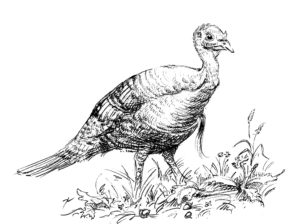It’s Only Natural: All You Wanted to Know About Wild Turkeys
By Leslie Watkins
For the past few weeks, I’ve observed 30 to 40 wild turkeys as they pass through my yard each day; three adult females and their broods. I want them to keep coming around, but don’t want to encourage deer by putting out food. I did some research on what foods will attract turkeys but not deer, and discovered that feeding turkeys is probably not a good idea.

Illustration by Leslie Watkins © 2007
Eastern Wild Turkeys are social animals that live within a pecking order. Turkeys that grow accustomed to human presence assign a sexual identity to people based on the way they behave. If the turkey views a human as dominant, it will assume you are a male and be fearful of you. If it views you as submissive, it will assume you are a female and try to bully you.
Turkeys that lose their fear of people can become aggressive and even attack. To protect both the turkeys and humans, it is important to be bold around them, especially when they first appear at your home. A spray of the garden hose, loud noises and dogs are enough to make turkeys keep their distance.
Another problem with letting turkeys feel comfortable around homes is their misinterpretation of their reflections. Turkeys that come close to windows, mirrors and other shiny surfaces may go after their reflections to drive the “intruder” away. Since the reflection does not disappear or cower, the turkey will continue to attack until the light changes, or the surface is covered up.
Turkeys eat all sorts of things from insects, grubs, snails, slugs, spiders and ticks, to grains, seeds, fruit, berries and nuts. They will also eat grass, leaves, buds, ferns and roots. If they spend too much time around bird feeders, they may excrete in the seed pile and spread disease, so it’s a good idea to clean up the seeds and let them forage for themselves.
With so much food and cover available in Norfolk, the turkey population is growing rapidly. To keep them from becoming a nuisance, it is important we act boldly toward them, don’t feed them and enjoy them from a distance.
Benjamin Franklin preferred turkeys to eagles, and had no doubts about a turkey’s courage. In a letter to his daughter, he wrote, “I am on this account not displeased that the figure is not known as an Eagle, but looks more like a Turkey. For in truth the Turkey is in comparison a much more respectable bird, and withal a true original native of America . . . He is besides, though a little vain and silly, a bird of courage, and would not hesitate to attack a grenadier of the British Guards who should presume to invade his farm yard with a red coat on.”
